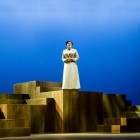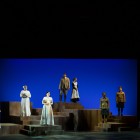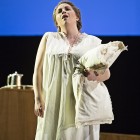Così fan tutte 2016Royal Conservatoire of Scotland
Read more about the opera Così fan tutte
The Conservatoire has developed an excellent reputation for its Mozart productions in recent years, and Così fan tutte also received a fine performance. Nicolette Molnár showed with her Merry Wives of Windsor a couple of years ago that she can produce a satisfying and intelligent interpretation, and with this Così she delivered one again.
The updating of operas, if it lacks consistency, can cause more problems than it solves. The time chosen here is that of the First World War. We start with the officers in battle dress, Ferrando's arm briefly in a sling, and Don Alfonso a middle-aged gent in tweeds. The sisters make their appearance in nurses' uniforms, thus introducing early on the context for Despina's later medical pranks. There is no chorus - four silent extras, two nurses and their patients, appear occasionally.
The departure for war is handled well. With the introduction of the foreigners there is little to disguise the faces, a stick-on moustache each - but the boys have changed regiment, appearing in kilts (Black Watch), as the 'grannies from Hell'. The visual gags are kept under control (bagpipes carried by Guglielmo before the serenade are discreetly removed by Alfonso). Much is made of the medical side of affairs. Despina's disguise for revival of the suitors is a surgeon's overall covered in old bloodstains, and the glee with which she produces a saw from her Gladstone bag would have inspired a miraculous cure in the men had they not had their backs to her.
The set was an abstract conglomeration of boxes and platforms of varying heights, linked by steps. There was no indication of interior, either café or villa, or of any garden. However there was plenty of variety in this approach to sustain visual interest. At start and finish a group of mannequins in female costume of various periods and styles appears, to confirm the moral of the tale.
All six roles were double cast for the run, and the standard of singing and acting on opening night was quite remarkable, with some fine collaboration in the ensembles that are so important in this work. The voices of the sisters, Charlie Drummond and Grace Durham, blended beautifully, and they sailed through their arias with ease. Khanyiso Gwenxane showed off an excellent voice, as comfortable in the lyrical strains of 'Un aura amorosa' as he was later in the more dramatic 'Tradito, schernito'. Christopher Nairne showed a genuine comic flair to match his superb singing, which included the rarely-heard Act 1 aria 'Rivolgete a lui lo sguardo'. Klaudia Korzeniewska and Colin Murray also gave accomplished performances, even if his voice, a lightish baritone, was less clearly differentiated from Guglielmo's than would be ideal.
Timothy Dean's conducting was beautifully paced and helpful to the singers. The only disappointment on opening night was the unreliability of the orchestra, largely, it seems, due to lack of rehearsal time.
A return visit on the final Saturday saw the second cast going through its paces. Tim Dean was ill, so his assistant (also working with Scottish Opera and with Donald Runnicles at the BBC SSO) took over with great distinction. There were still a few fluffs in the pit, but the playing was much improved. These singers were just as confident on stage as their colleagues, and their comparative lack of experience rarely showed - the acres of recitative were thrown off with aplomb in idiomatic Italian. Where the production varied from the previous cast was in the much greater emotional depth shown by Ferrando and Fiordiligi. The young Irish tenor Richard Shaffrey gave an altogether remarkable performance. He projected great affection for Dorabella at his departure, while later revealing himself as this cast's natural comedian. In the second half everything changed - from 'Il mio ritratto!' through his second aria and scene with Fiordiligi, the raw emotion and collapse of his ordered world was vividly depicted - it is all in the music, but few tenors and directors expose it as deeply. The rawness of tone sometimes apparent in his singing will need to be watched, however. He was well supported by Annabella Ellis's majestic Fiordiligi, eventually persuaded by his eloquence, then driven to real fury on discovery of the plot.
In all, this was a highly accomplished reading of a notoriously difficult piece.
The production photographs below are all of the first cast.
Performance Cast
- Ferrando a young army officer
-
Khanyiso Gwenxane (Jan 16, 22, 26)
Richard Shaffrey (Jan 18, 23)
- Guglielmo another officer, Ferrando's friend
-
Christopher Nairne (Jan 16, 22, 26)
Euros Campbell (Jan 18, 23)
- Don Alfonso a middle-aged bachelor
-
Colin Murray (Jan 16, 22, 26)
Stefan Berkieta (Jan 18, 23)
- Fiordiligi a young lady from Ferrara, engaged to Guglielmo
-
Charlie Drummond (Jan 16, 22, 26)
Annabella Ellis (Jan 18, 23)
- Dorabella Fiordiligi's sister, engaged to Ferrando
-
Grace Durham (Jan 16, 22, 26)
Jessica Eccleston (Jan 18, 23)
- Despina maidservant to the sisters
-
Klaudia Korzeniewska (Jan 16, 22, 26)
Joanna Norman (Jan 18, 23)











